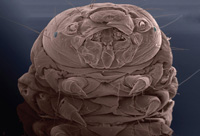Reciprocal genetic diversification and adaptation of host proteinase inhibitors and parasiteassociated proteinases during coevolution of insects and entomopathogenic fungi
Professor Dr. Andreas Vilcinskas
PhD student: Jennifer Schwarz
The intimate interaction of pathogen or parasite-associated invasive proteinases with proteinase inhibitors produced by animal hosts results in an evolutionary arms race of rapid and dynamic changes between both interacting protein types. The coevolution between the powerful and reliable lepidopteran model host Galleria mellonella and the parasitic fungus Metarhizium anisopliae may be accompanied by reciprocal adaptation between diversifying fungal metalloproteinase isozymes and insect metalloproteinase inhibitors (IMPIs). This project addresses the hypothesis that the previously discovered expanding repertoire of IMPIs in G. mellonella represents a counter-adaptation to the recently reported diversification of the M. anisopliae metalloproteinase. Particularly, the genetic basis of the expanding variability and functionality of the IMPI gene cluster through gene or domain duplication and subsequent domain shuffling as well as its genomic organization will be analyzed. In addition, targeted mutagenesis will be used to reconstruct their diversification and reciprocal functional shifts. Individual IMPI peptides were determined to exert distinct activities against either microbial metalloproteinases or matrix metalloproteinases, among them one has been shown to exert pleiotropic roles during innate immunity and metamorphosis in G. mellonella. These interacting molecules represent a unique model system to explore interdependencies between immune responses and development which can result in life-history constraints.

